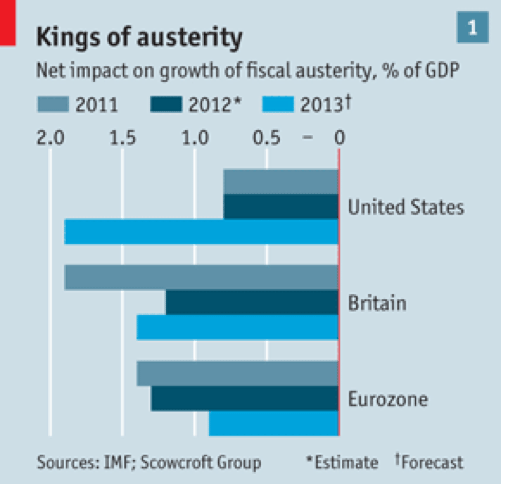Another day, another data point suggesting a zero fiscal multiplier:
The number of Americans filing new claims for unemployment benefits dropped to its lowest level in nearly 5-1/2 years last week, signaling labor market resilience in the face of fiscal austerity.
On the other hand, Matt Yglesias points out that most pragmatic economists are at least partly Keynesian:
A meta-point that is a little underappreciated here is that private sector macroeconomists all use models that embed broadly “Keynesian” assumptions about the behavior of the economy. Government economists at the OMB and CBO do it too, but they’re really just following the lead of what you would find at any bank or consultancy. Obviously that doesn’t prove that these models are correct—in fact that record of forecasting accuracy isn’t stellar—but I don’t hear much from anti-Keynesian types about why their preferred models have failed the market test.
If I were going to treat Yglesias the way he recently treated Alex Tabarrok, I’d say he’s attacking a strawman. But Yglesias (and Tabarrok) obviously understand the opposing argument. Nonetheless I find many people do misunderstand what “monetary offset” is all about.
It’s quite possible to write down a model where, ceteris paribus, fiscal austerity reduces output, and monetary stimulus (such as the recent actions of the Fed) raise output. You can call that model “Keynesian,” and attach a positive multiplier to fiscal policy if it makes you feel good. But what matters are counterfactuals. And if more fiscal stimulus leads to less monetary stimulus (as the Fed claims!), then the fiscal multiplier estimates will be nearly worthless. This is a subtle game theory problem, which as far as I can tell hasn’t even been considered by many Keynesian economists.
One can talk all one wants about Keynesian forecasters predicting that fiscal austerity would have a sharp contractionary impact in 2013. But the fact of the matter is that the consensus forecast for 2013 from all these supposedly Keynesian economists was about the same as for 2012, despite a much higher level of fiscal austerity in 2013.
By the way, the real “market test” isn’t what forecasters think, it’s what markets think. And as I’ve pointed out numerous times, the markets are market monetarist.
Here’s the sort of slowdown expected by The Economist:

Yes, this could still happen. Market monetarism says fiscal stimulus estimates are nothing more than estimates of central bank incompetence. And central banks are far from perfect. But I continue to believe that 2% RGDP growth should be the baseline forecast for 2013. Now we’ll just have to wait and see just how incompetent the Fed actually is.



Leave a Reply